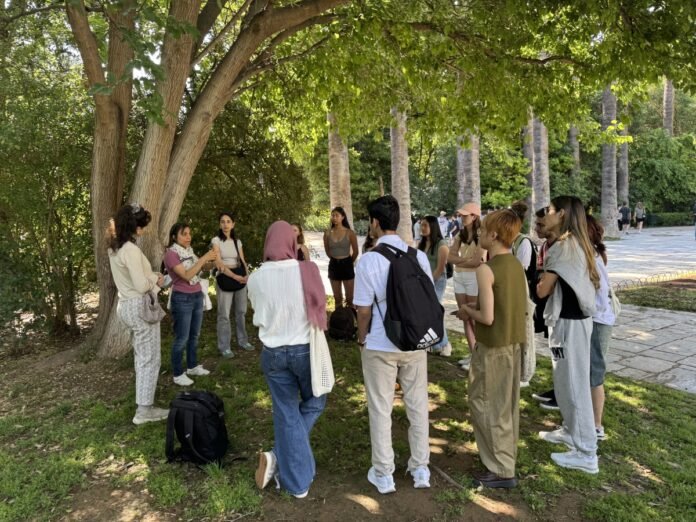Five juniors from Georgetown University in Qatar (GU-Q) took part in a unique summer programme. This programme combined marine research, fieldwork, and satellite technology. The GU-Q climate programme that the students joined—Adeena Hossain, Gwyneth Estomo, Tuan Nguyen, Raikhan Primbetova, and Saroosh Zahid—was an intensive two-week course titled Sensing Marine Ecosystem Health & Climate Impacts from Space. This programme ran in collaboration with Georgetown’s Earth Commons Institute and the National and Kapodistrian University of Athens (NKUA).
The course offered a hands-on experience. In addition to classroom lessons, students in the GU-Q climate programme analysed satellite data to track climate change effects on marine ecosystems. They also engaged in fieldwork across Athens and Andros Island. Their work was guided by Dr. Dionysios Raitsos of NKUA and Dr. Jesse Meiller from Georgetown University.
During the programme, students visited sustainable farms and coastal waters to collect phytoplankton samples. They also hiked through beautiful landscapes, learning about Greece’s environmental heritage. Adeena Hossain described the GU-Q climate programme as an “immersive experience” that blended academic study with real-world action.
Importantly, the programme emphasized community involvement. The students presented environmental assessments of the Andros marine ecosystem to local stakeholders. This was part of their engagement in the GU-Q climate programme. Additionally, they completed independent research projects using satellite data.
For example, Adeena and fellow student Nitya Gupta studied how seasonal upwelling decline impacts marine productivity along the Oman Coast. Meanwhile, Raikhan and her partner Nikolas Georgiou focused on phytoplankton productivity in the Gulf of Mexico. Raikhan highlighted that their findings underscored freshwater inflow’s ecological effects and implications for climate change.
Moreover, Tuan worked with GU Environmental Studies major Zoe Gutherman and NKUA’s Michail Karamolegos to analyse the Western Equatorial Atlantic. Combining environmental humanities, remote sensing, and chemistry, their research provided a broad understanding of climate impacts.
Overall, the GU-Q climate programme equipped the students on climate change to gain valuable knowledge and skills. It prepared them to contribute to global environmental challenges. The programme equipped them to apply satellite technology in addressing marine ecosystem health and climate change worldwide.


